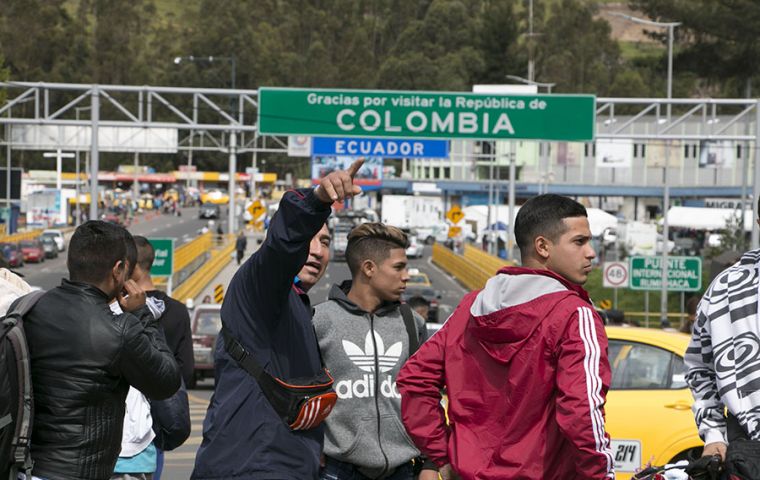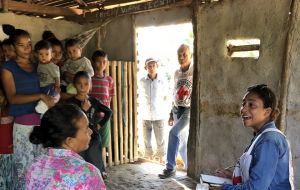MercoPress. South Atlantic News Agency
Colombia: The humanitarian situation worsened, alerted Red Cross
 The report indicates that Venezuelan migrants, as they pass through Colombia, are exposed to extortion and recruitment by various armed groups
The report indicates that Venezuelan migrants, as they pass through Colombia, are exposed to extortion and recruitment by various armed groups  “The situation is now more complex than at the time of the signing of the Peace Agreement with the FARC-EP.”
“The situation is now more complex than at the time of the signing of the Peace Agreement with the FARC-EP.” The International Committee of the Red Cross (ICRC) presented on Thursday the balance of its main humanitarian concerns in Colombia, highlighting a deterioration of security conditions in the most remote areas of the country. The cases of armed conflicts and the violence that has continued to plague Colombia in recent decades, as well as the recent mass exodus of Venezuelan migrants, showed a complex humanitarian context.
“The situation is now more complex than at the time of the signing of the Peace Agreement with the FARC-EP.” Several departments of the country have experienced a clear deterioration of the humanitarian situation, to which the conflicting dynamics at the borders and the the extreme vulnerability of migrants arriving in Colombia, “said Christoph Harnisch, head of the ICRC Delegation in Colombia.
”Beyond the numbers of people benefiting from our work, the truth is that no humanitarian support will suffice as long as the armed actors do not respect humanitarian norms and commit themselves to leaving the civilian population at the margin of hostilities and other dynamics of the conflict“, remarked Harnisch.
During the presentation of the annual ”Humanitarian Challenges 2019”, the head of the Delegation expressed his concern about the reality that exists in large areas of the country.
The report indicates that Venezuelan migrants, as they pass through Colombia, are exposed to extortion and recruitment by various armed groups, while women are at greater risk since they may also be victims of sexual violence.
According to UN data, nearly three million Venezuelans have left their country, many of which have crossed Colombia to continue their way to other countries in South America.
On the Pacific coast and in large areas of the east and south of the country, the absence of a state response to the basic needs of the communities, combined with the persistent violations of international humanitarian law and other humanitarian norms by the armed actors, have harshly affected the living and security conditions of the civilian population.
The ICRC has categorized five non-international armed conflicts in Colombia, and is studying other cases. According to its current legal classification, Colombia faces several armed conflicts between the State and the following Organized Armed Groups: the National Liberation Army (ELN), the People's Liberation Army (EPL), the Gaitanist Self-Defense Forces of Colombia (AGC) and the former structures of the Eastern Bloc of the FARC-EP that did not accept the peace process. In addition, throughout 2018 the conflict between the ELN and the PLA was included in this classification, which in the last few months has significantly affected the Catatumbo region.
Last year ICRC humanitarian action benefited about 186,000 people. The search for missing persons and the timely response to the needs of their families remains a priority for the organization.
For the head of the ICRC Delegation, the continued practice of the disappearance is of particular concern: “Since the signing of the Peace Agreement with the FARC-EP we have documented a case of disappearance in the context of armed violence every 4 days. However, our figures are not representative of the reality of the country, so the actual figure will probably be higher,” Harnisch added that it is unjustifiable that “all armed actors in the country continue using the disappearance to intimidate and control territories.”
During 2018, the ICRC supported and directed 2,500 relatives of the disappeared to continue searching for their loved ones and obtained information on more than 160 cases. In addition, the human remains of 45 people were recovered and handed over to the authorities for identification and 10 people held by armed groups returned to see their loved ones with the support of the institution.
Migrants were also one of the priority populations of the ICRC's action in 2018. The institution supported some 124,000 migrants, returnees and inhabitants of receiving communities. In this regard, the ICRC coordinator of operations in the field, Christoph Vogt, indicated that his exposure to the conflictive dynamics that are experienced in the border areas or along the migratory route implies additional risks for people who are already in a situation extremely precarious “The presence of armed groups exposes them to possible abuses, including extortion, threats, recruitment and physical violence, and women and unaccompanied minors are particularly vulnerable,” he added.




Top Comments
Disclaimer & comment rulesCommenting for this story is now closed.
If you have a Facebook account, become a fan and comment on our Facebook Page!